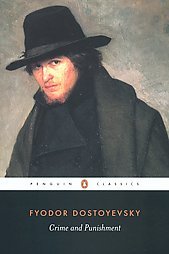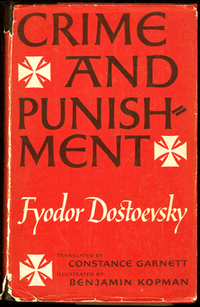First sentence: At the beginning of July, during a spell of exceptionally hot weather, towards evening, a certain young man came down on to the street from the little room he rented from some tenants in S--- Lane and slowly, almost hesitantly, set off towards K---n Bridge.
Premise/plot: Rodion Raskolnikov, the "hero" of Dostoyevsky's Crime and Punishment, has major issues. He's become convinced, mostly, that murder is justifiable if it's for the 'greater good' of mankind. He has thought a lot about this--even written an article about it. His abstract theory becomes his one consuming obsession.
Does he have what it takes to kill someone? More importantly perhaps, does he have what it takes to kill someone and get away it. In his mental state, he does not believe that the crime IS a crime. His "victim" (he doesn't see her as a victim) is a pawnbroker who "takes advantage" of the poor. The world would be a better place without her, wouldn't it? If it would be--and he is convinced it would be--it's the right thing to eliminate her. He plans everything out--to the best of his ability--but things don't go according to plan. He didn't plan on the victim's sister returning to their home mid-crime; he didn't plan on a second victim; he didn't plan on nearly being caught by young men who'd come to pawn their goods. He also didn't plan on his physical health coming unhinged just as his mental and emotional health was breaking down. Is his madness caused by illness? Is his illness caused by madness? Is his illness real or in his head? Is there a cure for what ails him?
His family--his mother and sister--come to St. Petersburg. His sister is newly engaged to a young man, a man Rodion disapproves of and despises. (It is mutual.) His mother is perhaps rightly worried about her son's well being. Fortunately one of Rodion's friends, Razumikhin, is there to provide comfort, support, and encouragement.
Another family is central to the novel as well. Semyon Zakharovich Marmeladov is an out-of-luck drunk whom Rodion meets early in the novel. This drunk tells the tragic story of his tragic family to anyone and everyone who will listen; he tells it with drink in hand of course. Rodion witnesses his new friend's death and makes sure that he's taken to his own home to die. He meets the soon-to-be widow, Katerina Ivanovna Marmeladova, and more importantly one of his daughters, Sonya. (She's been "forced" into prostitution in an effort to keep her family alive. Her father is an incompetent drunk and her mother is dying of consumption. She has, I believe, three younger siblings.) Rodion gives the family money for the funeral. He's not trying to cause a scandal; he's moved with compassion--pity--for their plight. Sonya becomes one of the main characters of the book. She is also the first person to whom he confesses his crime. (At this point he still doesn't see it as a crime.)
Most of the novel is about the cat-and-mouse game being played by Rodion Raskolnikov and the detective Porfiry Petrovich. Rodion becomes suspicious that the detective suspects him and is trying to trap him. So he tries to stay a couple of steps ahead of him. Likewise, Porfiry KNOWS that Rodion suspects that he's suspected. He knows that Rodion is trying to stay a few steps ahead. He also knows that ultimately Rodion will fail and that justice will be done. It doesn't matter to him if the case is resolved today or next week or next month.
My thoughts: Are ideas dangerous? Can a germ--a seed--of an idea become dangerous and deadly? Do ideas have consequences? What if theories and ideas and philosophies are carried out in day to day life and bear fruit?
I don't always "like" unreliable narrators. I haven't decided if the category applies here or not. Is he mentally ill? Is he mad? Did he know right from wrong when he committed the crime? If he was insane--was the insanity long-lasting? or was it temporary? When did his madness start? And what caused it? Was the idea fermenting in his mind the root cause? Is there a cure for his madness? Even if he's punished by the state, will he ever admit moral responsibility? That is will he ever come to see his crime as a CRIME. Will he come to see that his idea of justifiable murder is reprehensible? Or will he continue to think that the only crime--the crime he's being punished for--is the crime of getting caught, the crime of being incompetent, the crime of being weak?
According to Wikipedia, Dostoyevsky was inspired by a French murderer, Pierre Francois Lacenaire.
I have shared quotes from the novel in my weekly 'My Victorian Year' posts.
Here are my quotes from the last part of the book.
Power is given only to those who dare to lower themselves and pick it up. Only one thing matters, one thing: to be able to dare! (499)
All human beings need air, air, air...That above all else! (525)
There is nothing in the world more difficult than plain speaking, and nothing easier than flattery. If when a man is trying to speak plainly one-hundredth part of a false note creeps into what he is saying, the result is an instant dissonance, and following it--a scandal. In the case of flattery, however, even if everything in it, right down to the very last note, is false, it sounds agreeable and is received not without pleasure; even though it's a crude sort of pleasure, it's pleasure nevertheless. And no matter how crude the flattery may be, at least half of it always seems genuine. (568)
Everyone must look out for himself, and the best time is had by those who're best able to deceive themselves. (574)
But those people had the courage of their convictions, and so they were right, while I didn't, and consequently had no right to take the step I did. (649)
And here are my overall favorite quotes:
One can always forgive a man for telling lies; lying's a harmless activity, because it leads to the truth. (163)
"We've got facts," they say. But facts aren't everything: at least half the battle consists in how one makes use of them! (164)
Talking nonsense is the sole privilege mankind possesses over the other organisms. It's by talking nonsense that one gets to the truth! I talk nonsense, therefore I'm human. Not one single truth has ever been arrived at without people having talked a dozen reams of nonsense, even ten dozen reams of it, and that's an honorable thing in its own way; well, but we can't even talk nonsense with our own brains! Talk nonsense to me, by all means, but do it with your own brain, and I shall love you for it. To talk nonsense in one's own way is almost better than to talk a truth that's someone else's; in the first instance you behave like a human being, while in the second you are merely being a parrot. (242)
We've got accustomed to making do with other people's intelligence--we're soaked in it! (242)
The harmonious individual, it needs to be said, hardly exists at all. (270)
The living soul demands to live. (305)
It's impossible to leap over nature solely by means of logic! (305)
Pain and suffering are inevitable for persons of broad awareness and depth of heart. The truly great are, in my view, always bound to feel a great sense of sadness during their time upon earth. (315)
© 2018 Becky Laney of Becky's Book Reviews



3 comments:
Your wrap-up sounds so fascinating. I want to read more Russian classics and was debating between this one and War and Peace to read soon. The psychological depth in this one sounds great. I've heard it's an easier read than The Brothers Karamazov, which is the only Dostoevsky novel I've read so far :)
Paula, I loved The Brothers Karamazov. I can't say I loved Crime and Punishment, but I am glad I read it. Some characters/stories you just connect with better ;)
I will say this one made me want to rewatch Inception.
I have yet to read War and Peace. I have read Anna Karenina though.
Becky
I've read "about" this book for years and years, but it's high time I dusted it off and actually read it. Great ideas abound -- and your quotes make it sound fascinating!
Post a Comment